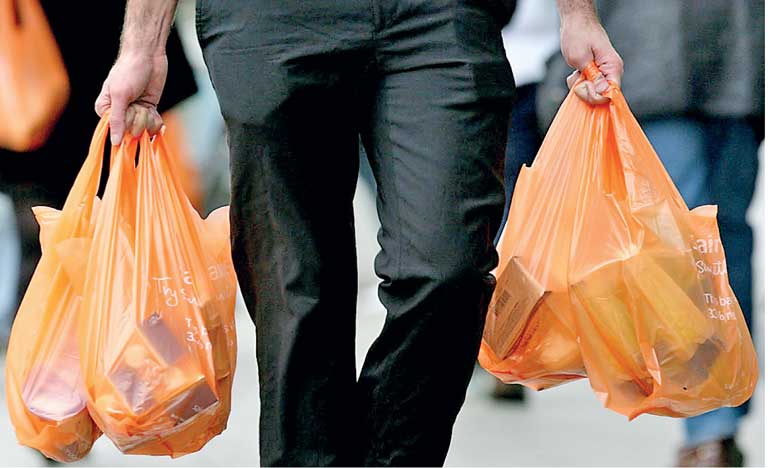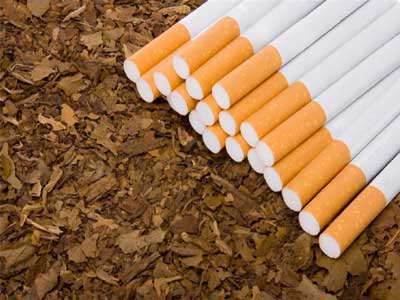Wednesday Feb 18, 2026
Wednesday Feb 18, 2026
Monday, 28 December 2015 00:05 - - {{hitsCtrl.values.hits}}

President Maithripala Sirisena has declared war against two products. In speeches in Parliament as well as outside, he has proclaimed that both these products would be banned beginning from 2016. One of the products to be banned is polythene. The other is tobacco. Both are goods from a personal consumption point, because people are willing to spend money to have them. However, they have been accused of delivering bad effects to society over many years when viewed from a social point. The cry for banning them has come from those who hold this latter view.
Many uses and abuses of polythene
Polythene is widely used by modern societies – there is no one who does not use it – in many different ways. It has saved trees by replacing paper bags. It is being used as a low cost conveyor of water in surface canals in deserts. The medical profession uses it to keep bacteria away from living bodies. The packaging industry loves polythene because of its light weight, water-proof quality, ease of handling and strength. These are a few uses of polythene but there are many more. However, it is accused of harming the environment by clogging drains, providing breeding grounds for mosquitoes and killing the aesthetic sentiments of people when littered. Hence, there is wide-spread animosity against polythene from many ranging from school children to grown-ups, though all of them have been using it liberally.

Sin tax on tobacco brings in handsome revenue to the government
Tobacco, on the other hand, is an addiction like addictions to alcohol or drugs. It is not necessary for human living. But addiction to tobacco by citizens is a blessing for governments which fill their coffers by handsomely taxing those who consume it. For instance, in 2015, Sri Lanka’s Treasury had planned to raise about Rs 68 billion by taxing tobacco consumers – a kind of a sin tax to punish those who commit the sinful act – up from Rs 57 billion raised in 2014. This is nearly a half of the expenditure on health services by the government. Tobacco tax, along with the other sin tax on alcohol, has financed nearly the total expenditure on health services by the government of Sri Lanka. Tobacco provides a handsome revenue source to governments throughout the globe. But all societies have taken up arms against the tobacco industry. Their charge is that it has brought in nation-wide health hazards from cancer to bronchitis. Hence, President Sirisena’s war cry against both polythene and tobacco – it can be safely predicted that pretty soon it will be extended to alcohol as well – is simply an instance of echoing the society’s popular animosity against them.
The culprit is bad management of polythene and failure to recycle
This writer has argued in a previous article in this series that it is not polythene which is the culprit. It is the bad management of polythene coupled with failure of societies to recycle it that has brought about the woes about which societies are complaining (available at: http://www.ft.lk/article/33719/Banning-polythene-to-green-the-globe--Alternatives-are-not-that-green-either ). The summary of the article is as follows.
Every good produces a bad in the form of waste matter
Every economic activity produces a ‘good’ in the form of a usable product or service and a ‘bad’ in the form of ‘waste-matter’. While the good is used, the bad is dumped into the environment. But that does not lead to environmental pollution because all these bads are absorbed, assimilated and recycled by agents employed by nature. Thus, ‘waste-matter’ is converted by these agents to a ‘beneficial-matter’ for reuse by all. A good example is the carbon dioxide that we exhale. Plants, an agent of nature,absorb carbon dioxide in producing nutrition for them and make it available to us in the form of oxygen for us to inhale. Hence, every good has a bad and every bad is recycled by nature. Environmental pollution occurs when bads are dumped to environment overstretching nature’s assimilative capacity. This is where human action is needed and the menace of polythene is one such area where human action is warranted. But that does not call for banning of polythene. Rather it calls for better management of the use of polythene and recycling of same which nature has been unable to do. Industry should be encouraged to recycle polythene by offering ‘tax credits’, an incentive payment for doing so. There should be a ‘recycling audit’ in order to ensure that the industry does its job well. Hence, banning of polythene as pronounced by the President, is not the solution to the problem. It simply denies society of the services of a faithful servant.
Recycling is even merited in Buddhist literature
Recycling of waste-matter is not a new phenomenon and its value has been known for many thousands of years. There is a story relating to recycling concerning Elder Ananda, Chief Aide of the Buddha, as narrated in Dhammapadatthakatha, a commentary written for elucidating Dhammapada, an anthology of stanzas pronouncing the Buddha’s doctrines. In this story, Queen Samawati, Chief Queen of King Udeni of Kausamba, had donated 500 clothes to Elder Ananda in appreciation of a discourse he had preached to her and her assistants. Puzzled by Elder Ananda’s acceptance of so many clothes, King Udeni questioned him on whether it was in order for him to do so in view of the frugal life which all disciples of the Buddha had been living. Replied Elder Ananda: “I use one and give the rest to other monks whose robes have now worn out”. It led to a series of questions by the King and answers by Elder Ananda. “What will they do to their existing robes?” “They will give them to those monks whose robes are still in a worse state” “What will they do with their decayed robes?” “They will make them bed sheets” “What will they do to their old bed sheets?” “They will make carpets of them” “What will they do with the old carpets?” “They will make door-mats” “What will they do to their old door-mats?” “They will cut them into small pieces, mix them with soil and use the mixture to plaster the walls” The moral of this story is that there is nothing that can be wasted; they can be reused again and again in a different form until such time their further usage does not matter anymore.
Prof Visvanathan of AIT: Polythene can be converted to clothing yarns
Polythene and plastics can be recycled in a number of ways. One is to covert them to polyester and rayon to manufacture textiles. Dean of the School of Environment, Resources and Development of the Thailand based Asian Institute of Technology Professor C Visvanathan, revealed to this writer in an interview with him that there is efficient technology now available for converting polythene into rayon (available at: http://www.ft.lk/article/408071/-Solid-waste-no-more-waste-but-like-gold--says-Sri-Lankan-born-scientist-C--Visvanathan ). This comes in the holistic waste management system developed by AIT which is now being practised in a number of countries. AIT is willing to transfer technology to Sri Lanka if the country is interested in introducing holistic waste management.
Local bodies can develop systems of collecting used polythene
In recycling polythene and plastics, Sri Lanka could develop a system of collecting them through municipalities and other local bodies. The incentive for them to do the collection job is the additional income which the local body would get out of such new activities. According to Visvanathan, Sri Lanka may not have a sufficient volume of plastics and polythene to operate a factory with the necessary scale. However, both India and China are hungry for plastic granules that are being used for producing polyester yarn and, in the initial period, the country could join the Asian supply chain to keep these two countries supplied with raw materials.
Examples of converting polythene and plastics into usable materials
Many factories have sprung up in the developed world to convert plastics into polyester as shown in the following video on YouTube (watch: https://www.youtube.com/watch?v=zyF9MxlcItw ). The method of recycling old plastic bags into new plastic bags is explained in the following video (watch: https://www.youtube.com/watch?v=Q2IQWV8Q5JU ). The general recycling of plastics, as practised in USA on a wide-spread basis, is presented in the following video (watch: https://www.youtube.com/watch?v=s5p6Nk3SzcU ).Converting used plastics into polyester is only one application of recycling of the material. There are many, like converting it to oil as shown in the following video relating to South Korea (watch: https://www.youtube.com/watch?v=qyHEZhTg01M ). Hence, the solution to the so called plastics and polythene menace is not the banning of the material but introducing means of its proper management including recycling. The polythene manufacturers should be given incentives to introduce appropriate collection and recycling methods. That should be the national policy of Sri Lanka.
The isolation of cigarette manufacturing industry for attack
Now, let’s turn to tobacco. Tobacco is used in Sri Lanka largely for manufacturing cigarettes and chewing with betel leaves, a traditional practice of many Sri Lankans from all walks of life. The use of tobacco in betel chewing is so common and popular in Sri Lanka that an alms-giving ceremony or chanting of Pirith, both attended by Buddhist monks, is not complete unless the attending monks are offered a serving of tobacco-containing betel along with meals. The addition of tobacco to betel chewing to give it an extra stimulating power would have been a practice adopted by Sri Lankans in the last 200 years. But, now it has come to stay as a major ingredient in betel chewing creating a demand for tobacco and providing an income source for farmers. The health hazards of tobacco consumption come from both cigarette smoking and betel chewing. Yet, society’s demand for restricting the consumption, marketing and trading of tobacco has been directed only toward cigarettes manufactured by multinational companies and not for betel chewing. That demand is not directed even to cigars and cigarettes made in cottage industries in the country and they operate free of barriers. As such, betel-chewing can be done in public places, sold to youngsters and marketed without the warning that it would cause cancer. Ironically, it appears that society is interested in protecting itself from consuming tobacco in the form of cigarettes and not otherwise. The advisors to President too appear to have been guided by this narrow conception.
Many biotechnological breakthroughs in the recent past
But recent advancements in biotechnology have changed the public’s perceptions about tobacco completely though they have so far not reached Sri Lankan policy makers. Biotechnology is a scientific field which harnesses cellular and biomolecular processes to develop technologies and products that help improve the lives and the health of all living beings. The breakthrough biotechnological discoveries have led to new medicines, treatment methods, food items and efficient and cleaner energy devices, to mention but a few. Biotech companies in advanced countries have become leading generators of new technologies for the benefit of those living on this planet. Having recognised the value of biotechnology as a leading sector in the global economy in the years to come, Singaporean authorities advised all their universities and higher learning institutions to concentrate and develop biotechnology, among others, in the new millennium. Today, that city state is a powerhouse in biotechnology and genetic research.
Biotechnology has converted tobacco plant into a miracle plant
The Tobacco plant has become the latest attraction to biotechnologists. Biotechnological processes applied to tobacco plant have generated at least four new scientific breakthroughs. If one evaluates tobacco in terms of these breakthroughs, one may hesitate to brand it as an evil plant as is being done by modern societies.
Use of tobacco leaves for producing biodiesel and ethanol
One biotechnological breakthrough has been the generation of biodiesel by using young tobacco leaves. A US plant science company called Tyton Biosciences has genetically modified tobacco to yield a higher output of ethanol and biodiesel than corns and soy beans which are at present used for the same purpose (available at: http://www.thecropsite.com/news/16050/producing-ethanol-and-biodiesel-from-tobacco/ ). According to this company, one acre of tobacco can replace 8 to 12 acres of corn or soy that are currently being used for producing the input for these two products. What it means is that corn and soy could be used more for human and animal consumption than for producing ethanol and biodiesel. The tobacco-ethanol-biodiesel production also generates three by-products, namely, glycerine, F1 proteins for animal feeds and fertiliser rich with nitrogen. An Italian biotech company called Sunchem has reengineered the tobacco plant to produce jet fuels for Boeing which uses this new fuel along with the South African Airways (available at: http://www.roadandtrack.com/new-cars/news/a8483/why-not-make-biofuels-from-tobacco/ ).
Tender tobacco plants functioning as vaccine producing factories
The second biotechnological breakthrough relating to tobacco is the use of the tobacco plant itself as a factory producing vaccines for two diseases that have so far escaped the curative systems of the modern medical industry. One is the Ebola virus and the other is a blood cancer known as ‘follicular lymphoma’. In both methods, the virus is inserted to the tender tobacco plant and its DNA, stronger than the alien virus, fights with the virus and produces antibodies that can cure both diseases.
Ebola vaccine from tobacco
Ebola has been a serious epidemic that has paralysed many countries in West Africa. Without a proper cure, many thousands of West Africans have fallen victim to Ebola. The new breakthrough using tobacco plant has been developed by KBP in a facility in Kentucky in USA by injecting the antibody ZMapp to just 21 day old tobacco plants. (available at: https://www.youtube.com/watch?v=uCW6qeJt-JA ).The advantage of plant based vaccines is that they can be directly applied to patients without having to use intermediate animals to produce the antibodies. This can be replicated in any country that can be cultivated tobacco and countries affected by Ebola can therefore produce anti-Ebola vaccines on their own soils.
Cancer causing tobacco to help cure cancer
Follicular lymphoma is a slow growing blood cancer without serious advance symptoms affecting both men and women generally in middle age. If it is diagnosed at early stages, radiation therapy can be used but at advanced stages, patients require chemotherapy. However, as is the case with many cancers, the success rate has been very low. In the new breakthrough, the vaccine is grown in the genetically engineered tobacco plant instead of growing it in animals (available at: http://blogs.discovermagazine.com/80beats/2008/07/22/tobacco-plants-can-grow-a-vaccine-to-fight-lymphoma/#.Vn4uabZ96t8 ). This process is quicker, less expensive and less risky to patients compared with the use of animal cells for producing vaccines. As in the case of Ebola vaccine, the tobacco plant itself is functioning as a factory that produces the vaccines which can directly be applied to the patient to build his or her own immunity system to fight the blood cancer.
A tobacco free of tar and nicotine can help smokers to quit smoking
The fourth breakthrough concerns the complete reengineering of the tobacco plant to produce tobacco free from tar and nicotine, the two chemical ingredients that bring health hazards to tobacco users. The war against tobacco is mainly fought on the ground that it causes cancer and many other tar-nicotine related ailments. If a cigarette can be produced free from tar and nicotine, that cigarette should be welcomed by governments, civil society organisations and the general public. Biotechnology has helped scientists to produce such a tobacco plant that could be used for producing a cigarette that has no health hazards (available at: http://rense.com/general12/nico.htm ).
The need for a positive approach
What is revealed by the scientific breakthroughs that are happening in the rest of the world is that Sri Lanka is set to overreact to a perceived menace in which society has labelled both polythene and tobacco as culprits. Both these products are not ‘sin products’ as perceived by the public. With proper management and recycling in the case of polythene and biotechnological research and application in the case of tobacco, both these products can be converted to items that serve mankind better. It is, therefore, a case of the advisors to the President taking note of what is happening in the rest of the world and giving him sound advice that calls his government to adopt a positive approach for better results.
(W.A Wijewardena, a former Deputy Governor of the Central Bank of Sri Lanka, can be reached at [email protected] )